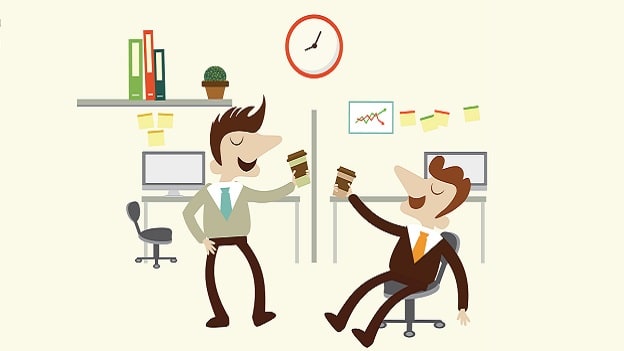Catch 22: When a friend is also a co-worker

Human being comprise of several identities, depending on the multiple roles they play in their lives, and these identities and roles cannot be confined in water-tight compartments, for they tend to overlap. No matter how hard we may try to keep our personal and professional identities separate, there comes a point where they fuse, and often with not so favourable results.
Several organisation thus have policies that prevent hiring of next of kin, or even distant relatives, owing to ‘conflict of interest’. The logic and argument provided is simple, that working with family will complicate your work, demand you to make compromises owing to partiality in treatment, personal conflicts and eventually cost the company, even if you don’t intend to. However, such a restriction is hardly put on allowing friends and acquaintances from working together. On the contrary, most organisations encourage employees to recommend friends. Many are tempted to recommend a close friend for job openings at their workplace, without thinking twice about the consequences, or even gauging whether they would be a right fit for the same or not. The tendency to see the many benefits, of the work being more enjoyable, the camaraderie making the job more fun, and a presence of unequivocal support makes one oblivious to some obvious red-flags that are likely to appear:
- One of your careers might progress faster: Even the thickest of friendships can fall prey to jealousy and envy, and a real test in your friendship will be if one of you manages to secure a promotion or raise faster than the other. It is much easier to turn green when someone achieves success, rather than being selfless and supporting them. The popular media and culture is riddles with examples and instances of friendships going sour owing to jealousy, and such instances of friends falling out are all too common in offices as well.
- Conflict management will be more challenging: Solving a conflict where your friend is involved becomes tremendously difficult. Imagine being asked to take sides, between your friend and say, a senior employee, or a few other members of the team. People who have been in these situations will verify that standing up to who is right doesn’t matter, for you are bound to either alienate your friend, or the other party, no matter what choice you make. Your decision, despite taken with the best of intentions, will either jeopardize your friendship or your professional relationships.
- Your rapport may run others the wrong way: While you may enjoy working closely with your friend, and prefer to take up projects together, but your tendency to be casual, loose with words, and making inside jokes can drive your colleagues or your boss to view you as crossing lines, or being unprofessional. They are likely to blame your rapport as a distraction, if you miss a deadline or fall short on targets. Furthermore, with your friend in the picture, you are less likely to be more inclusive of others, maybe without even realising so. This is likely to invite resentment from others.
- Your growth and learning is likely to be affected: You are likely to work with your friend, on similar projects, and will probably never get honest criticism from them; but always a sugar-coated version. Unless your rapport poses a formidable risk to the team dynamics, and the two of you give best results when you work together, you are likely to be paired together every time, thereby reducing your chance to work with diverse people, and depriving you of the opportunity to increase your knowledge and experience.
These are only a few of the potential problems that could arise, if you bring you friend on board, especially if you work in the same team, or the organisation is small. Unforeseen challenges could arise, based on your equation outside of workplace. However, if you do find yourself in a pickle, after you referral works out, a few simple steps can save the situation:
- Be invested in each other’s success: Although this depends on the closeness in your friendship, but being personally invested in helping your friend succeed and expecting them to do the same is likely to avoid any conflict that might arise. Since you are likely to know each other’s strengths and weaknesses, you are likely to give each other a sound perspective when one goes off-course.
- Honesty is the best policy: As clichéd as it may sound, being honest from the moment you begin working together is essential. You and your friend should have an understanding that in the office, both of your responsibility is to be impartial, and if either of you does make a mistake, the other one should communicate it clearly.
- Establish boundaries: Never leverage your friendship to exploit benefits, and put boundaries, as to how much of a limb you can go out on, to help your friend. If you constantly use your friendship to avail benefits or have access to information you are not supposed to, not only is your friendship likely to be stressed with time, but your colleagues might begin keeping information from you both.
- Know when to be inclusive of others: Too much of anything is bad, and when you work, eat, hang out, and spend time, with the same person for a larger part of your work life, that too while internalising frustrations and criticism, the consequences could be deadly for your friendship. Maybe making rules to ensure that you include others, like eating lunch with different people, or taking up projects with other colleagues regularly will diffuse any possible untoward situation.
While it is easier to assume that getting your friends to work with you will make it more fun and easy, the reality might not always be so. Working together might be a great opportunity to strengthen friendships, but might as well spell a death knell for friendships. Different viewpoints and approaches, miscommunication, and jealousy are all steps to conflict, which sometimes creates irreparable damage. Studies have highlighted both the pros and cons of working with friends, but whether your friendship stands the test of workplace and its politics, is largely dependent on how close friends you are, and how you view and respect each other!
Have you ever worked with a close friend? Did you face any unexpected challenges? Let us know!











